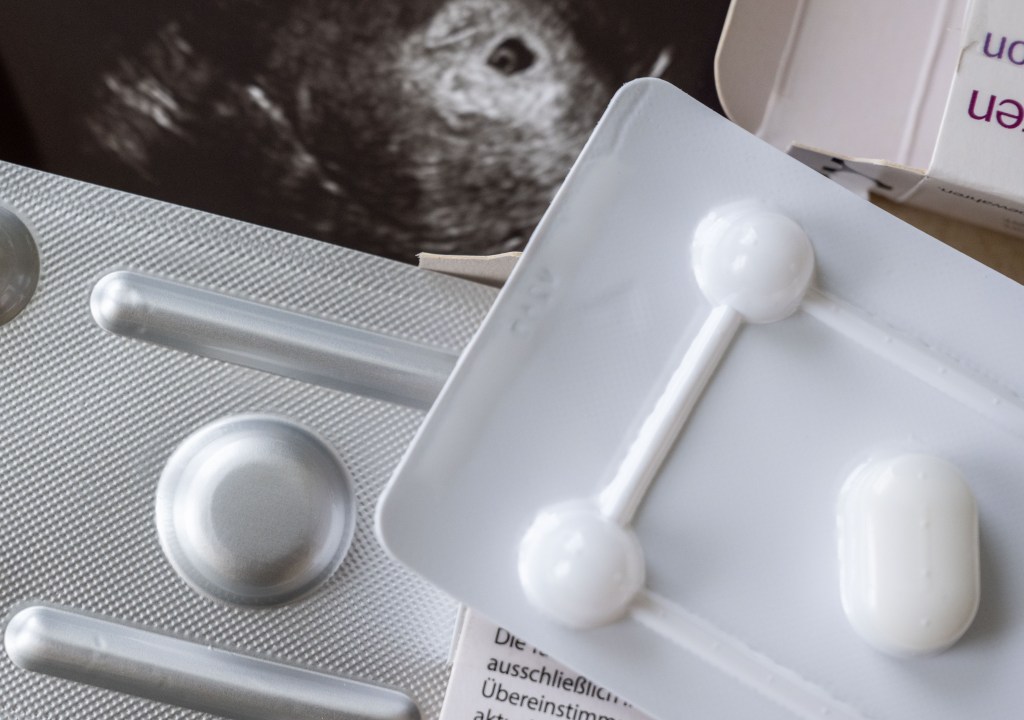
Pro-life advocates reacted with shock at the beginning of the month when the Food and Drug Administration approved a generic version of the abortion pill. They responded by urging President Donald Trump’s administration to reverse the greenlighting of what is now the third mifepristone product on the market in the United States.
Some opponents of Health and Human Services Secretary Robert F. Kennedy Jr., whose views on abortion have troubled many conservatives, pointed to the approval as evidence that Kennedy’s appointment was a mistake. Among them was former Vice President Mike Pence, who called on the secretary to resign. Even for anti-abortion activists who did not go as far as Pence—such as Susan B. Anthony Pro-Life America President Marjorie Dannenfelser, who said the FDA’s decision was “reckless” and “unconscionable”—the approval served as another example of how the second Trump administration, which just last week unveiled a plan to reduce the prices of the costly drugs used for in-vitro fertilization, has fallen short in protecting the unborn.
In response to the backlash, the FDA contended that its hands were tied in approving Evita Solutions’ application for a generic mifepristone, which is usually taken with another drug as part of a medication abortion. “The FDA has very limited discretion in deciding whether to approve a generic drug,” HHS communications director Andrew Nixon told The Dispatch. “By law, the secretary of health and human services must approve an application if it demonstrates that the generic drug is identical to the brand-name drug.”
The FDA approved Danco Laboratories’ original version of mifepristone in 2000 during President Bill Clinton’s administration. Under the Federal Food, Drug, and Cosmetic Act, companies can develop their own version of a drug once the original manufacturer’s exclusive rights to sell it expire, and the agency has little leeway in deciding whether to approve the new generic.
“The FDA does not have as much discretion here as its critics like to think, and so long as mifepristone is on the market, not approving a qualifying generic version is hard to do (and, if the FDA did it, there’s a good chance it would be reversed in court),” Jonathan Adler, a professor of administrative law at William and Mary Law School, told The Dispatch.
To gain approval for a generic copy of a drug, manufacturers must prove that the generic version functions in the human body the same way as the original. If the drug developer can meet that standard, the agency is legally bound to approve it, Dan Troy, who served as the FDA’s chief counsel under President George W. Bush, told The Dispatch.
Simply disagreeing with the drug’s availability or saying that it is controversial is not a justification to deny approval, and doing so on that basis would open the FDA up to lawsuits. “I would counsel the agency that that is not a tenable position to be in,” Troy said. “Now, a lot of drug companies don’t want to sue the FDA to force an approval, but in this arena, people are very willing to sue the FDA.”
The outcry over the Evita Solutions generic comes despite the fact that it is the second generic version of mifepristone to receive FDA approval. A company called GenBioPro received approval for a generic during the first Trump administration, in 2019, drawing few headlines. One reason critics have paid more attention to the FDA’s approval of the Evita Solutions generic is that key restrictions on the availability of the drug were lifted during President Joe Biden’s administration. The FDA in 2021 allowed doctors to prescribe mifepristone online and permitted patients to order it by mail, rescinding a decades-old requirement that such prescriptions be picked up in person. Anti-abortion doctors and medical groups asked the Supreme Court to overturn those changes, but the court ruled last year that the plaintiffs did not have standing to sue the administration.
The pro-life movement has been clamoring for Trump to restore those safeguards, opposing the drug on anti-abortion grounds and arguing that it is unsafe for women, but it’s unclear whether his administration has the political appetite to take action at a time when medication abortion has become the most common way of ending pregnancies. During the 2024 campaign, before Trump picked him as his running mate, Vice President J.D. Vance affirmed his support for women having access to the drug. However, even if the administration attempted to make a concerted effort to restrict mifepristone, recent history shows it could run into legal trouble if it attempts to do so purely based on policy preferences.
Years before Trump took office, abortion rights groups believed that both the George W. Bush administration and the Barack Obama administration were unjustly restricting over-the-counter purchases by minors of Plan B, a morning-after contraceptive that critics deem an abortifacient because they say it can prevent the implantation of a fertilized egg. In 2013, a federal judge in New York found that political considerations were behind the two presidential administrations’ restrictions on the drug, and he ordered Obama’s FDA to remove those barriers. That litigation history could make it difficult for Trump to move against mifepristone today if he tries to do so merely on the basis of a political or ideological opposition to its availability. The Plan B case “is very much a kissing cousin to” the controversy over mifepristone, Troy told The Dispatch.
If the Trump administration does want to restrict the abortion pill, it will need data proving it has adverse health effects. Pro-life advocates contend that such data is already available, and they argue that it is inconsistent for the FDA to approve a new mifepristone drug while it has indicated there could be dangers in taking it. Days before the FDA approved the new drug, Kennedy announced that the agency would conduct a review of the safety and efficacy of the pill.
“The agency is supposedly asking these questions about mifepristone right now,” Katie Glenn Daniel, director of legal affairs and policy counsel for Susan B. Anthony Pro-Life America, told The Dispatch. “So what information did they have that they felt was enough, or what pressure, statutorily or otherwise, did they feel? Those are questions we’re still asking.”
Mifepristone has long been a controversial drug, but the recent raising of concerns about it on health grounds has been spurred on by research from the Ethics and Public Policy Center, a socially conservative think tank in Washington, D.C. It released a study in April that analyzed insurance claims and found that close to 11 percent of women who took the pill experienced serious adverse events, such as hemorrhaging, infection, or an emergency room visit. That prevalence is 22 times higher than the 0.5 percent figure listed on the FDA’s warning label. Critics have pointed out that the study is based on a data set that is not public and that it is not peer-reviewed.
Still, the study was cited in a letter signed by all but two Republican senators—Sens. Lisa Murkowski of Alaska and Susan Collins of Maine, two pro-choice GOP members—asking the administration to reconsider the generic mifepristone’s FDA approval.
“While we recognize the FDA’s statutory responsibility in evaluating drug applications, the timing of this approval appears inconsistent with the comprehensive safety reassessment your agencies have prioritized,” the group, led by Sen. Lindsey Graham of South Carolina, wrote to Kennedy and FDA Commissioner Marty Makary earlier this month.
Now, Republican senators are demanding more answers. Sen. Bill Cassidy of Louisiana, who chairs the Senate Committee on Health, Education, Labor, and Pensions, led a group of his colleagues on an oversight letter to Makary on Thursday, asking for clarity on what data the FDA and HHS have on adverse events from mifepristone in the wake of the generic approval. That group used even stronger language in condemning the authorization of the generic drug.
The letter reads: “To be clear: this approval … flies in the face of President Trump’s strong statement that he is ‘the most pro-life president’ in history and his dedication to protecting the lives of unborn children and keeping women safe.”
















